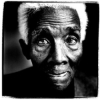C. L. R. James

C. L. R. James
Cyril Lionel Robert James, who sometimes wrote under the pen-name J. R. Johnson, was an Afro-Trinidadian historian, journalist and socialist. His works are influential in various theoretical, social, and historiographical contexts. His work is a staple of subaltern studies, and he figures as a pioneering and influential voice in postcolonial literature. A tireless political activist, James's writing on the Communist International stirred debate in Trotskyist circles, and his history of the Haitian Revolution, The Black Jacobins, is a seminal text...
NationalityTrinidadian
ProfessionJournalist
Date of Birth4 January 1901
The country has undergone a profound social upheaval, the greatest the proletariat has ever known.
After World War I the resentment of the working class against all that it had to suffer was directed more against Morgan, Wall Street and private capital than the government.
My father was a teacher, and there were teachers all around, his friends, they were working for the Government and their behaviour was within strictly limited areas.
Cricket is first and foremost a dramatic spectacle. It belongs with theatre, ballet, opera and the dance.
It is not only that Germany has been defeated in the war, Kaiser Wilhelm's Germany was defeated.
The Paris Commune was first and foremost a democracy. The government was a body elected by universal suffrage.
The patience and forbearance of the poor are among the strongest bulwarks of the rich.
The late development of mass industrial organization in the United States has both stimulated and retarded the political development of the American working class.
Technological discoveries are the spermatozoa of social change.
If you are not their slaves, you are rebels.
I had formed a black movement, so I would speak for the Trotskyist movement and then walk about a hundred yards to where the black movement was speaking.
The international proletariat first appeared on the scene in the early Thirties of the nineteenth century, and its first great action was the French Revolution of 1848.
First of all, Bolshevism represents...
Dissimulation is the refuge of the slave.